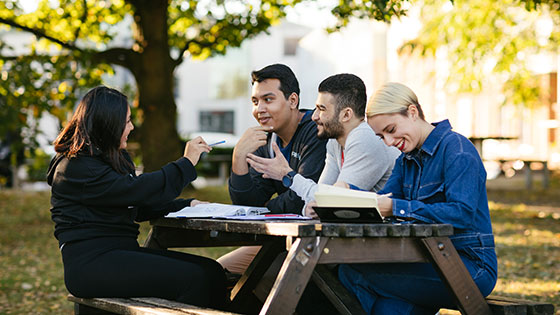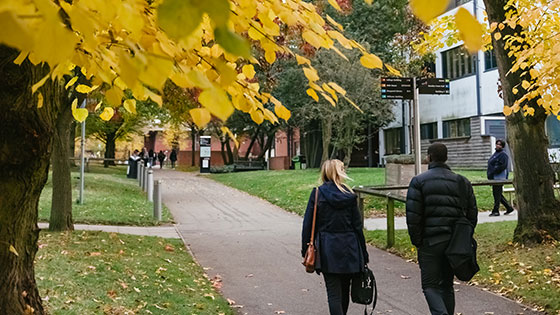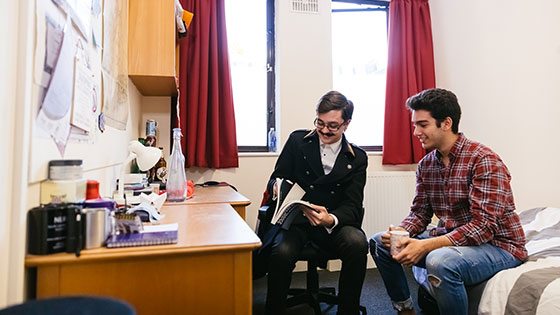We want you to know about what we do to encourage students to remain healthy and safe during their time with us. We also highlight policies and procedures ensuring we're GDPR compliant with regards to student information.
We encourage all students to register with a General Practitioner (GP) when they begin their studies for routine healthcare appointments and treatments.
We also suggest students check the status of their vaccinations as soon as possible, in particular Measles, Mumps and Rubella (MMR) and Meningitis (MenACWY). There is more information on contagious and infectious diseases on UniHub.
We work closely with The Uni Doctor. This Wembley-based GP practice often attends on-campus events and offers online registration, on site GP clinics and vaccinations.
Certain treatments are provided by the NHS and is free for everyone. For specialist treatments such as dentistry, there is usually a cost associated. There are also fees for international/overseas students.

For emotional health and wellbeing students are encouraged to access our self-help material and to reach out to Student Support and Wellbeing teams when they need a helping hand.
 Our campus is generally a safe place for students and we have campus security available 24/7.
Our campus is generally a safe place for students and we have campus security available 24/7.
Our Security team are based in the Quad and can be contacted by calling 0208 411 4329 9.00am to 5.00pm Monday to Friday.
In an emergency or out of hours, students can contact the Campus Watch 24 hour by calling 0208 411 6200.
Any student worried about their safety should talk to a member of staff who will be able to advise them on their best options.
Some students may like to download a personal safety app such as Hollie Guard.
Here are some recommended Police general safety precautions that we advise students to take:
We know that sexual assaults and unwanted sexual behaviour go largely under-reported. We want to increase awareness of sexual offences, and help to make victims or witnesses feel more comfortable in reporting them.
If you've been a victim of unwanted sexual behaviour on the transport network, report it to the police by calling 101 or texting 61016. You will always be taken seriously, and we will do all we can to investigate and catch the perpetrator.

The Resident Assistants (RAs) are recruited by the accommodation team to support and help students settle into their new life in Halls. They work alongside many services at the University to ensure students receive the support they need but also enjoy their time at Middlesex University.
They encourage students to interact within the hall and create a community environment. Many activities are held throughout the year that bring residents together and promote wellbeing within the hall.
If your student is staying in our halls of residence, it's advised that they check any insurance cover very carefully so that they are clear whether they have cover, and whether it is adequate. The accommodation team will be able to offer more advice.
University is very different to college or sixth form as students attending university are treated as adults who are responsible for their own studies and welfare. Confidentiality between students and staff is important in developing trusting relationships which are best placed to develop the agency and independence of our students.
UK law and university policy (General Data Protection Regulation) prohibit the disclosure of an individual’s information to a third party. This means that if you make contact with any member of the University and ask about a student, staff will not be able to divulge any details of the student – including whether they are a registered student at Middlesex University. This includes parents and carers.
All Universities in the UK follow similar guidelines and are bound by the same legislation. For this reason, we encourage students to keep in contact with their parents, carers, guardians, friends and supporters. We realise that this can be frustrating, but trust the reasons for this are understandable.
If a student is under the age of 18, we are permitted to liaise directly with parents or guardians with respect to their welfare. We first need to verify the relationship of the enquirer to the student – usually the student has listed their parent or guardian on their record and so this is easy for us to check with security questions. Even where the student is under 18 years of age, we prefer that they are aware that the enquiry is being made about them and to involve them wherever possible.
If a student is working closely with a Student Support and Wellbeing team, and they give their written consent to the team, it may be agreed (on a case by case basis) that staff contact the student’s nominated contact to discuss their progress.
In certain exceptional circumstances and with the student’s written consent, we may communicate with a third party, if the University deems it is in the interests of those concerned.
The University offers help to students in difficulty, and we strongly encourage students to pro-actively engage with self-help and support services as soon as they feel that they are beginning to struggle.
It is important that it is recognised that students attending Middlesex are adults and living in an adult environment, and we encourage and expect them to take responsibility for their own wellbeing.
We take our duty of care to students very seriously. You can read more about our safeguarding Care and Concern process.
However, we can only offer support if approached by the student. In cases where the student is thought to be at risk, appropriate action will be taken by those concerned.
If you have concerns about the wellbeing of a student at Middlesex University, you should, in the first instance, encourage them to contact the appropriate Student Support and Wellbeing Team.
If the student is unsure of which team to approach, they can explore the support information on Unihub
Unfortunately, University Counselling & Mental Health services cannot make unsolicited contact with a student, even at the request of an academic or family member. Friends and family can be a crucial resource for providing encouragement and support to the student, enabling them to eventually contact the right support services and attend a counselling drop-in session and/or submit an online self-referral form.
If you are concerned because you have not been able to contact a student and you are worried about their wellbeing, you can make contact with the University. However you should expect that, because of data protection law, we will not be able to confirm whether someone is a student at Middlesex University.
We will be able to take the details of your student, contact them on your behalf to let them know that you have contacted us, and ask them to make contact with you. The onus will be on the student to contact you and staff will not generally get back in touch with parents, carers or friends directly.
For other concerns, whilst staff cannot talk to you about individual students, they are always willing to listen to your concerns and give generic advice and information.
If you wish to contact the University, please contact UniHelp.
If you have severe concerns about a student, on working weekdays 9.00am to 5.00pm you can call our Security team on 0208 411 4329 and ask to speak to a Designated Safeguarding Officer.
Out of hours, you can contact Campus Watch 24 hour control room on 0208 411 6200.
If your student is living in university accommodation, these are serviced by 24 hour security who are on hand to provide support. In each case, for the reasons outlined above, the staff member you speak to will not be able to confirm the student’s identity, attendance, or any other information, but your concerns will be taken seriously and we will respond to them appropriately.
You may find this information about crisis situations helpful.
If an emergency takes place on campus appropriate staff may contact the next of kin (without the student’s permission), if it is deemed appropriate. This would normally be on the advice of professionals such as medical staff.
Young Minds provides a Parent Helpline for parents, carers and those working with and concerned about their child’s mental health (defined as young people under 25 years of age).
Out of operating hours, you can contact the Parents Helpline via their online contact form. They aim to answer emails within three working days.